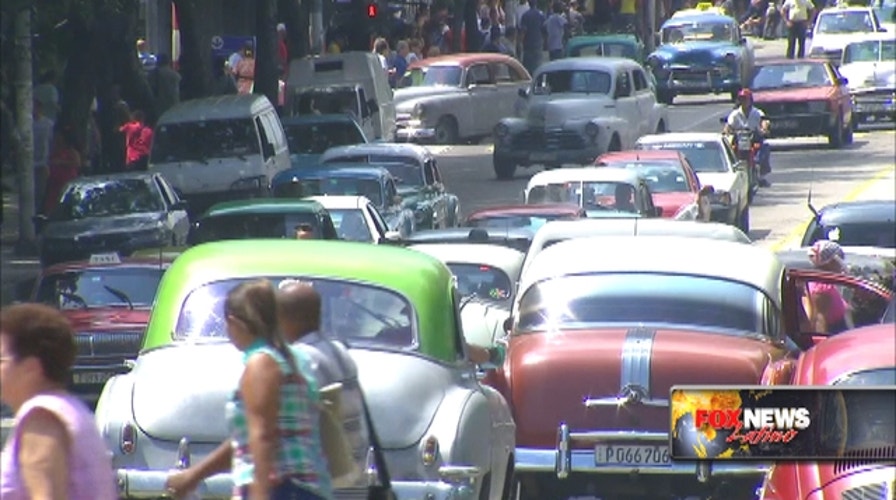Traveling to Cuba has never been easier
Fox News Latino's Elizabeth Llorente speaks to Marazul Charters' Bob Guild about how easy -- and cheap -- travel to Cuba can be.
Travel to Cuba will take a dramatic turn in the next week or two when several major airlines begin commercial flights from many U.S. cities to the long-forbidden island.
Many restrictions remain, of course, because of the U.S.-Cuba embargo.
But the Obama administration has eased or eliminated so many rules on travel that just about anyone who wants to go to Cuba can qualify under one of the 12 categories of approved travel established since relations between the two country began to be restored almost two years ago.
Group trips generally are most expensive since many are all-inclusive and don’t always have the best deals in airfare, lodging or meals.
Many U.S. airlines, hoping to dominate travel to the island, are offering low introductory fares, and the competition is resulting in big savings from the $2,000 or so that charter flights used to charge.
- Cuba’s official reaction to Obama easing embargo restrictions? Protests
- Cuba’s opposition movement has grown stronger since U.S.-Cuba deal, dissident says
- Great-uncle who fought to keep Elian Gonzalez in U.S., dies at 79
- Homegrown fashionistas bursting into scene in Cuba
- Tourists flock to Fidel Castro’s birthplace in Cuba
- Young Cuban-Americans get new impressions on island visits
- First U.S. to Cuba cruise in decades arrives in Havana
- New class of pampered purebred dogs emerges in Cuba
By the end of November, for example, Jet Blue will be flying from Fort Lauderdale and Orlando in Florida to Havana for as low as $54 each way, and from New York to Havana for $99. Southwest Airlines flights from Florida will be about $150. United will fly out of New York City's airports, including Newark International, for about $200 round trip.
“The airlines are competing with one another, they’re fighting for market share,” said Bob Guild, vice president of Marazul Charters, a New Jersey-based travel agency that has been organizing trips to Cuba for several decades. “The tickets on one particular flight can vary, but in general they’re about half the price of what charter flights used to be.”
Categories of allowed travel to Cuba include visiting family, trips by journalists as well as academic, religious and artistic exchanges. Most people who don’t fit in the other classes would select what's known as people-to-people exchanges, which no longer need to be arranged through tour groups and organizations.
The people-to-people requirements are so broadly defined, Guild said, that almost anything qualifies.
“[Visitors] are responsible for having a full schedule which includes meaningful exchanges with Cuban people,” Guild said. “People visiting their relatives … is still the largest single category – for anyone who has relatives who is either born on the island or born here but has Cuban ancestry.”
What the U.S. change in travel policy does not officially allow is going for purely recreational reasons, Guild noted.
“Beach travel is still not allowed under the regulations,” he said.
Hotels are filling up fast – many of the most popular ones are booked through May, he said.
Many Cuban citizens now may open their homes to tourists, including on Airbnb, which features Cuba accommodations that are less expensive than the fancy, state-owned hotels. Many people charge less than $70 a night.
“More are opening up every day in Havana and throughout the whole island,” Guild said.
With the election of Donald Trump as president and a Congress with both chambers under Republican control, many have wondered what will become of the two-year restoration of relations between the former Cold War enemies.
Many Republicans in Congress have vehemently opposed the steps toward normalized relations that President Barack Obama has undertaken, saying that they disproportionately benefit Cuba, which has been reluctant to make democratic reforms. Surveys have showed that Cuban-Americans in Florida are now less supportive of the U.S.-Cuba embargo, but they apparently voted in large numbers for Trump – possibly because of Obama's more liberal approach to Cuba.
Senate Republicans have vowed not to confirm Obama's nominee for U.S. ambassador in Havana, where the U.S. Embassy was re-established in 2015 after decades of being just an interests section.
Guild says he is optimistic that eased trade and travel between Cuba and the United States will remain in place because, he said, some influential Republicans favor restoring ties and many U.S. businesses – such as nearly the entire agricultural sector – want to work with their Cuban counterparts.
“Cuba is the only country in the world where we have travel restrictions,” Guild said. “A majority of Cuban-Americans are now in favor of President Obama’s policies. The Chamber of Commerce of the United States has been opposed to the travel restrictions and the U.S. embargo for many years.”
He added, “I don’t think it’s going to happen, that it will all be reversed.”

